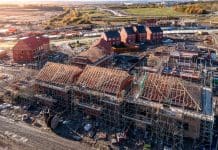Build costs continue to rise despite a drop in material prices, according to a recent report from the Southern Construction Framework
The quarterly benchmarking survey provides insights into the supply chain, covering suppliers and contractors.
It helps contractors make informed decisions about material specifications, construction methods, off-site or automated construction techniques, as well as project planning and scheduling.
Inflation continues to affect build costs
According to research from the Southern Construction Framework, building costs rose by an average of 3% in Q2 compared to the previous quarter. This rise in costs is primarily due to inflation from higher utility and labour expenses.
However, research from the Department for Business and Trade’s ‘all work construction material price index’ shows a 1.3% decrease in material prices in June. This led to a 2% drop from last year’s prices.
The largest quarterly price increases were found in M&E (Mechanical and Electrical) at 5%, Dry Lining at 4%, Curtain Walling at 4%, and Groundworks at 4%.
“Our data shows that a drop in material prices is not being fed through the supply chain, with a lag existing between a drop in material costs and overall build cost reduction,” said Kingsley Clarke, SCF operations lead for the South West.
“With insolvencies at near record highs, subcontractors, which have potentially been more greatly impacted by inflation due to lacking economies of scale and working with tight margins, may now be looking to improve margins through keeping costs higher,” he continued.
Labour costs have also affected build costs negatively, as the ability to repair labour costs continued to challenge the industry. The rise in costs has led workers to demand higher wages.
Many contractors say this has created a highly competitive culture in the skilled labour sector. Trade supply chains have also reported an increase in staff turnover.
The Southern Construction Framework predicts more price hikes
The Southern Construction Framework’s main contractors and trade supply chain forecast predicts that building costs will rise by a further 4% by Q2 of 2024. Carpentry and joinery are predicted to rise the most, at 6%, while Brickwork, M&E, and Concrete Frame are predicted to grow by 4 and 5%.
This forecast is backed by the BCIS, who predict that build cost inflation will reach 3.2% between Q2 2023 and the second quarter of 2024.
“Costs are still high across the industry, and while contractors are expecting a 6% lower increase in building costs over the next year, compared to this time last year, when contractors predicted a 10% increase, many businesses are still feeling the pinch,” concluded Adam Sanfor, Southern Construction Framework’s operations lead.














